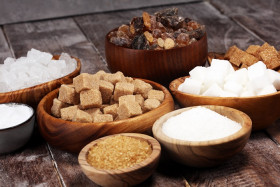Sugar alcohols as a way to adjust energy value?
Jun 7, 2022
Current topics such as the introduction of Nutri-Score or the product reformulation, as well as the tendency of manufacturers to meet ever-increasing demand for healthier products have inspired us to focus on the determination of sugars and sugar substitutes in the form of natural sweeteners.
Our efforts resulted in the successful inclusion of the analysis of the determination of alcoholic sugars (polyols / polyalcohols) in our accreditation scope.

The European Food Safety Authority (EFSA) has been asked by 5 European Nordic countriesto set a scientifically based tolerable upper intake level (UL) for dietary sugars from all sources. UL is the maximum amount of nutrient that can be safely consumed for a long time. The long-term survey was presented with results confirming the connection (with varying degrees of certainty) between the dietary sugar intake and a number of health problems (such as development of cardiovascular disease, obesity or hypertension).
An interesting fact was that the risk of adverse health effects increases linearly. Although a scientifically based "safe income level" has not been set, EFSA recommended the lowest possible intake of added and free sugars in the context of a nutritionally balanced diet.
The connection with polyols is obvious – given their lower energy content, higher sweetness, or smaller fluctuations in glycemia during their consumption.
Polyalcohols include the following approved sweeteners: sorbitol, mannitol, xylitol, isomalt, maltitol, lactitol and erythritol; and are present in natural products, e.g. in some fruits. Their energy value is defined by Regulation 1169/2011 at 10 KJ / g (compared to sugar, which has 17 KJ / g).
For food purposes, they are produced as naturally identical substances from carbohydrate raw materials. They are thermostable, so they can be used in baking and cooking, where in addition to the sweet taste, they also provide sufficient volume and some of them bind water well. Their non-cariogenic character is also significant (it is most pronounced in the case of xylitol). Bacteria in the mouth metabolize polyalcohols more slowly than sugar, thus reducing the acidity of the environment that promotes tooth decay. As a result, they are often added to chewing gum, breath fresheners or toothpastes.
Polyalcohols cannot completely replace sugar but to a certain extent, the recipe and energy value of the whole product can be corrected by their addition.
For more information on analyses, please contact us at +420 226 226 998
or czsupport.food@alsglobal.com.

